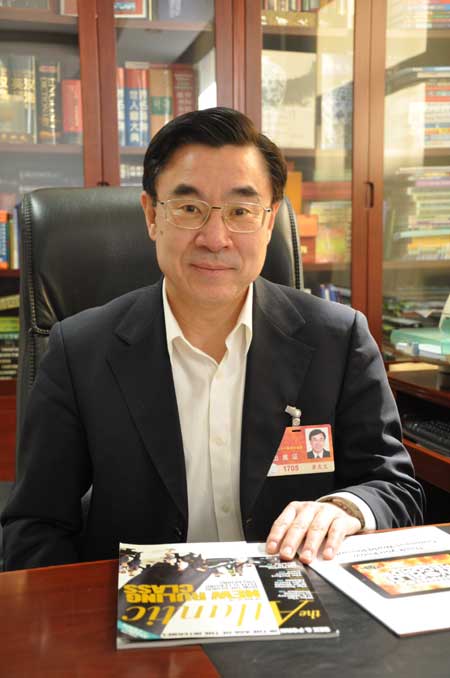China slowly learning public diplomacy: Huang Youyi
- By Wang Ke
 0 Comment(s)
0 Comment(s) Print
Print E-mail China.org.cn, March 5, 2011
E-mail China.org.cn, March 5, 2011
Richard Lugar, the leading Republican on the US Senate Foreign Relations Committee, recently claimed China had overtaken America in terms of "soft power" and called on the Obama administration to take urgent action.
But Huang Youyi dismissed the Senator's fears. "In fact," he said, "China's public diplomacy is at a very early stage." Not that Huang, who is vice president of China International Publishing Group (CIPG) and secretary-general of the Translators Association of China, underestimates the importance of influencing world public opinion.
Huang thinks public diplomacy has many advantages over inter-governmental contacts. Official diplomacy, which deals in power relationships, necessarily retains hard-edged and ideological aspects. But public diplomacy is much more about image, influence and persuasion.
"In public diplomacy, the participants don't have to restrict themselves to diplomatic rhetoric, because there are no treaties to sign or official announcements to make," Huang said. "They can cover a wider range of issues and use more straightforward language."
Almost anyone can participate, Huang said. Leaders of public organizations, scholars, commentators, social activists, and even ordinary tourists, all have a role to play.
China's extraordinary economic success, symbolized by overtaking Japan to become the world's second largest economy, means its voice is more readily listened to.
"When you are weak, very few people listen carefully to what you say. But when you get stronger, even repeating same words can have a very different impact," Huang said.
But he cautioned that, in contrast to the absolute size of the economy, China's GDP per capita is not even in the world's top 100.
And he said the overseas public still has many prejudices and misunderstandings about China.
"We want the world to understand China, a huge developing country with a population of 1.3 billion. But we can't rely on the Western media, because it has a track record of bias and prejudice," he said. "We need a loud and clear voice from our own side."
 |
|
CPPCC member Huang Youyi, vice president of China International Publishing Group (CIPG) and vice chairman and secretary-general of the Translators Association of China, says China is gradually improving its public diplomacy. [By Wang Ke/China.org.cn] |
Huang pointed to initiatives like the 2009 Boao Forum for Asia conference on Hainan Island which attracted more than 1,700 politicians, business leaders and academics from around Asia, and the 2010 Shanghai Expo, which attracted more than 70 million visitors, as examples of public diplomacy in action.
But he underlined that the West's approach is far more sophisticated than China's, noting that the term "public diplomacy" was coined as far back as 1965 by Edmund Gullion, a US career diplomat.
The Internet plays a key role
Huang said the Chinese media, especially the English-language media, can play a crucial role in public diplomacy, especially in explaining the government's stance on foreign affairs to overseas audiences. He said the government should give the media more flexibility and support to engage in public diplomacy.
But he said the Internet is now the most widely used channel for accessing information.
"With a click of the mouse, you can know the whole world. Because it is borderless and up-to-the-minute, the Internet possesses advantages that traditional media like newspapers, magazines and even television cannot match," he said.
Through websites like China.org.cn, Huang said, the world has gradually come to understand that despite China's impressive economic growth, its ordinary people continue to face many difficulties, and the government's main focus is on improving their standard of living.
"The public overseas is gradually beginning to understand that China is not on a path of achieving hegemony but cherishes equality. The Chinese people value kindness, patience, wisdom and virtue," he said.



 Add your comments...
Add your comments...

